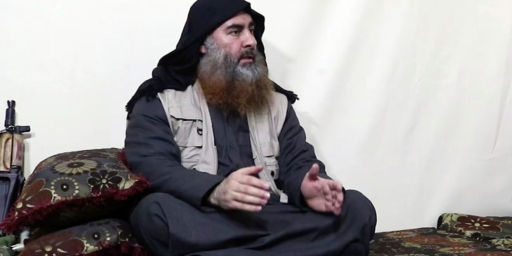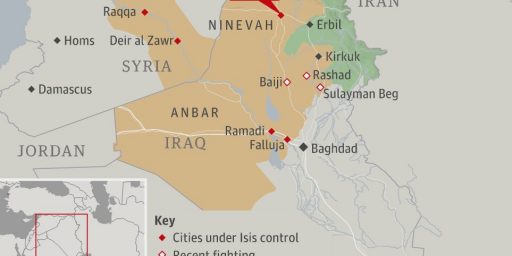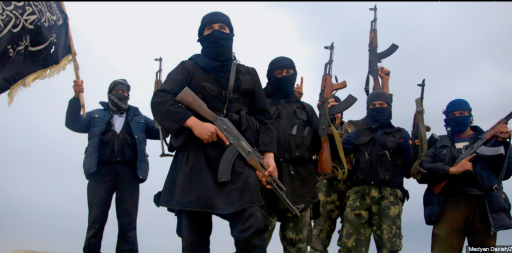Islamic State in Iraq Head Killed
Abu Omar al-Baghdadi, one of the major terrorists in Iraq, has been killed.
U.S. and Iraqi forces have killed the head of the self-styled Islamic State in Iraq, an al Qaeda-led militant group that has claimed many major attacks in the country, Iraq’s deputy interior minister said on Thursday. Hussein Kamal said Abu Omar al-Baghdadi had been killed in a battle north of Baghdad. He declined to say when but said authorities had recovered Baghdadi’s body.
This one looks legit, as American leaders are not issuing their standard cautionary notes.
Given that killing off thugs, including the Hussein family, Abu Musab al-Zarqawi, and more “number two man in [fill-in-the-organization]” than you can shake a stick at, has done little to improve the situation on the ground in Iraq, I’ve generally been skeptical when these reports come down. Still, Evan Kohlmann believes this may be yet another sign of a crumbling of the Islamist coalition:
In the wake of the recent and very public rift between the Sunni Islamic Army of Iraq (IAI) and Al-Qaida’s “Islamic State”, yet more cracks are suddenly beginning to show in the unified jihadist coalition that Al-Qaida has been trying to assemble in Sunni regions of Iraq. Today, the IAI–along with factions from at least two other predominant Sunni militant groups, the Mujahideen Army and the notorious Ansar al-Sunnah Army–have officially announced the formation of their own separate political coalition: “The Reformation and Jihad Front” (RJF). This new front would seem to be a direct challenge to the authority of Al-Qaida’s “Islamic State” and is said to enjoy support from Sunni Islamist circles (like Ansar al-Sunnah) which have, in the past, worked closely with Al-Qaida. The new “Reformation and Jihad Front” is also courting the involvement of the 1920 Revolution Brigades, though it is–as of yet–unclear what their reaction has been.
In the short term, slaying a dragon and having it replaced by dozens of snakes could make the security picture even worse. In the longer run, though, it should be good news.






In the short term, slaying a dragon and having it replaced by dozens of snakes could make the security picture even worse. In the longer run, though, it should be good new
It would be if that were actually the case–a better analogy would be that we’re just chopping heads off of the hydra. Cut one off, two more take it’s place.
It’s not clear to me….is this the creep that was killed earlier in the week or was this the result of a different skirmish?.
Great news! Its comforting to see that we have accomplished the mission. This is clear evidence that the insurgency is in its last throes. Luckily we were able to make sure that the smoking gun did not appear as a mushroom cloud. Freedom is on the march!
No, different creep, and we’re still not sure if the creep that was killed last week was actually killed.
Of course, while we may be angered, depressed, demoralized or otherwise inhibited by the death or maiming of our soldiers, our enemies are only strengthened whenever they suffer casualties. Clearly, if I understand the arguments presented in the comments above correctly, they can be summarized as, heads the insurgents win, tails the forces of democracy lose. How indescribibly clever and irrefutably powerful these arguments appear to be.
That’s because they understand something about insurgencies you evidently don’t: military force loses to it. It is a tactic specifically designed to defeat a militarily superior opponent and when your opponent relies entirely on military force to defeat it then they will lose. All of this is laid out very nicely in General Petraeus Counterinsurgency manual if you’d like to read it.
No, insurgencies generally aren’t able to beat military forces, which is why they remain as …, wait for it…, insurgencies. They are, however, on occasion able to win political battles even when losing on the battlefield virtually every frickin’ time (see Vietnam and Iraq). Clausewitz was correct about war being an extension of politics by other means. Needless to say, my politics aren’t yours.
Alex I have seen this hydra and it has many donkey heads on it too, the cancer keeps growing back, so we should stop trying to cure it? Triumph what in the great bloody blue hell are you talking about and why do you keep saying it over, and over, and over, and over again? Tlaloc only cowards bow down to intimidation, but I guess I can see why a liberal like you puts so much faith and has so much reverence in a tactic that uses fear to sway a noncomplying majority.